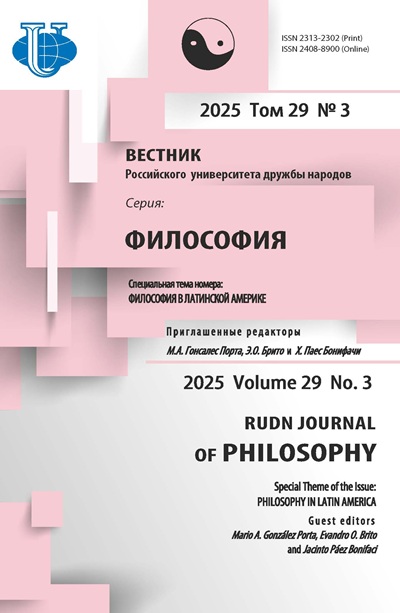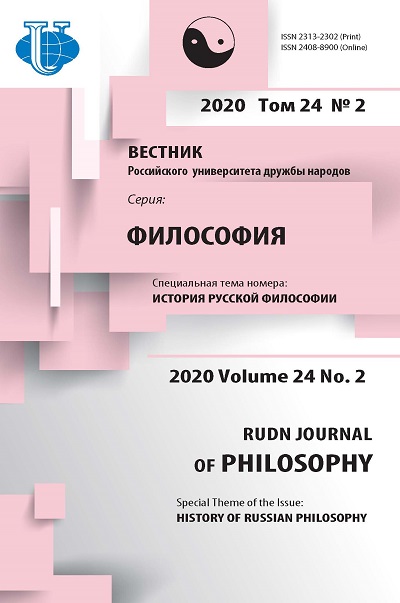К истокам формирования русского неокантианства: методологические основания философии А.И. Введенского
- Авторы: Владимиров П.А.1
-
Учреждения:
- Филиал Самарского государственного университета путей сообщения в г. Саратов
- Выпуск: Том 24, № 2 (2020): ИСТОРИЯ РУССКОЙ ФИЛОСОФИИ
- Страницы: 219-227
- Раздел: ИСТОРИЯ РУССКОЙ ФИЛОСОФИИ
- URL: https://journals.rudn.ru/philosophy/article/view/23677
- DOI: https://doi.org/10.22363/2313-2302-2020-24-2-219-227
- ID: 23677
Цитировать
Полный текст
Аннотация
В статье раскрывается значение и вклад А.И. Введенского в становление русского неокантианства на примере системного и комплексного рассмотрения его исследований. Внимание уделяется значению критической методологии А.И. Введенского для последующего развития русского неокантианства в первой трети XX века. Метод «логицизм» обозначается как неотъемлемая часть критицизма, который заключается в элиминации догматических оснований из философского дискурса. В свою очередь критическая методология, понимаемая в качестве теоретического инструмента построения целостной картины мира в согласованности с научным знанием, служит основанием для выявления проблемного поля корреляции рационального и иррационального. Обозначенные вопросы и проблематика познания в работах А.И. Введенского становятся началом формирования русского неокантианства как направления, которое противопоставляется догматизму и религиозно-философским исследованиям. Развивая критическую методологию, русский философ обращается к рассмотрению роли философии при формировании мировоззренческих оснований. В содержании статьи последовательно раскрываются ключевые положения философии А.И. Введенского, от постановки вопроса о методологических основаниях критицизма до выявления специфики философии по отношению к научным дисциплинам, на примере экспериментальной психологии, опирающихся преимущественно на эмпирические методы. В заключение статьи обозначает перспективы изучения трудов А.И. Введенского для установления объективности значения критического идеализма в истории становления отечественной философской мысли и апробации сущности критического мышления.
Ключевые слова
Об авторах
П. А. Владимиров
Филиал Самарского государственного университета путей сообщения в г. Саратов
Автор, ответственный за переписку.
Email: sturmrock@yandex.ru
кандидат философских наук
Интернациональный проезд, д.1а, Саратов, Российская Федерация, 410004Список литературы
- Минаев Д.Н., Некрасова Н.А. «Психология без метафизики» А.И. Введенского. К вопросу о проблемах сознания в русской философии // Научные ведомости. Сер. Философия. Социология. Право. 2016. № 24 (245). С. 169-171.
- Белов В.Н. Русское неокантианство: история и особенности развития // Кантовский сборник. 2012. № 1 (39). С. 27-39.
- Зеньковский В.В. История русской философии. М.: Академический проект, 2001. 880 с.
- Бирюков Б.В., Бирюкова Л.Г. Александр Иванович Введенский как логик. Ч. I // Логические исследования. 2011. № 17. С. 43-68.
- Введенский А.И. Логика как часть теории познания. Изд. 5-е. М.: Ленанд, 2014. 440 с.
- Введенский А.И. Логика для гимназий. Изд. 3-е. Петроград: Тип. М.М. Стасюлевича, 1915. 175 с.
- Введенский А.И. Психология без всякой метафизики. М.: Книга по требованию, 2013. 391 с.
- Введенский А.И. Новое и легкое доказательство философского критицизма. СПб.: Сенатская типография, 1909. 25 с.
- Введенский А.И. Лекции по истории Древней философии. СПб.: Лит. Богданова, 1912. 374 с.
- Введенский А.И. О пределах и признаках одушевления. Новый психо-физиологический закон в связи с вопросом о возможности метафизики. СПб.: Типография В.С. Балашовъ и К˚., 1892. 119 с.
- Введенский А.И. О видах веры в ее отношениях к знанию. М.: Типо-лит. И.Н. Кушнеревъ и К˚, 1894. 77 с.
- Введенский А.И. Философские очерки. Выпуск 1. СПб.: Типография В.С. Балашовъ и К˚, 1901. 213 с.
- Дудышкин В.А. Проблема соотношения веры и знания в гносеологии А.И. Введенского // Вестник ТГУ. 2009. № 5 (73). С. 63-66.
- Введенский А.И. Опыт построения теории материи на принципах критической философии. М.: Либроком, 2011. 352 с.
- Малинов А.В. А.И. Введенский в историко-философской литературе // Вече. 2004. № 16. С. 283-306.
Дополнительные файлы















